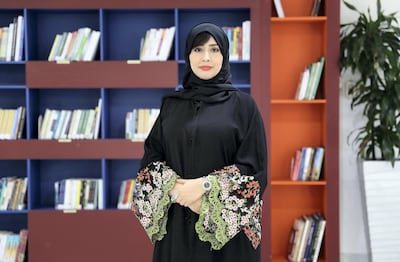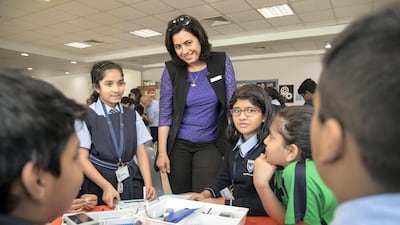The UAE’s mandatory moral education subject is best taught throughout the school day rather than as single weekly lesson, headteachers said.
A number of schools have begun threading the themes and coursework into other subjects to achieve better results.
The mandatory 45-minute class introduced in September 2017 is taught in government and private schools nationwide.
The aim is to develop a sense of civic duty and community while touching on local customs and culture, which the government sees as crucial in a country of more than 200 nationalities.
Nargish Khambatta, the principal of Dubai Modern Academy, said the school weaves elements of moral education into creative subjects and during field trips, in addition to holding the weekly class.
“Time was big constraint as you cannot keep adding on to the plate of the teacher,” she said.
“We had to be creative with the timetables and have embedded this into their curriculum.”
To engage pupils in lesson, they are presented with situations or examples of ethical dilemmas to which they must find solutions.
Field trips incorporate elements of moral education and civic duty, and pupils are assigned social media or video campaign projects on topics related to moral education.
“There is flexibility in terms of how we can deliver content,” Ms Khambatta said.
Rashmi Nandkeolyar, principal of Delhi Private School Dubai, said there too, staff were challenged by a full syllabus.
“The best way to teach moral education due of paucity of time is to integrate it with all the lessons in a planned manner,” she said.
In her school, English teachers have sought to spell out the subject’s theme through creative letter-writing.

Ikrame Sbai, a PhD student at The British University in Dubai, held focus groups in a small study that found teachers are struggling with large class sizes, lack of resources and teaching children values within a short span of time.
The study, Experiences and Perceptions of Teachers and Parents about the Impact of the Moral Education Programme Implementation in Dubai Schools, was published in the Journal for Researching Education Practice and Theory in October.
“Most of the teachers told me they only get a few hours to teach moral education and needed more time,” Ms Sbai said.
“They also called for more flexibility.”
She said teachers suggested more field trips would be useful so they could take pupils to mosques and other places where they could bring moral education to life.
“Teachers lack resources to be creative in delivering the instruction. Moral education teachers asked for more flexibility to teach the subject... they should not depend only on the curriculum,” the study found.
In March, a report revealed that a quarter of UAE schools were not meeting standards in moral education and teachers struggled to engage pupils and plan adequately for classes.
Last month, the Education Affairs Office at the Crown Prince Court in Abu Dhabi, which introduced the subject, said 1,500 teachers would undergo training to better engage pupils in moral education classes, with more to follow.
Laurie Joiner, assistant head of primary at Dubai British School, Jumeirah Park, said moral education is difficult to teach in a traditional classroom.
“It would be useful to have some kind of resources or list of places we could visit, because trips are wonderful tools to teach moral education. I think we need more of these opportunities,” she said.
“Moral education is to do with values so it is difficult to assess and quantify while setting it into the time table is another challenge.”
Her school introduced a ‘Value for the Month’. Children are given a value, such as kindness, honesty, respect, resilience or giving, which they should show in their behaviour in various lessons.
Children who perform the best are celebrated with certificates at the end of the month.
“We wanted the children to learn these values and embed these in their character,” she said.


